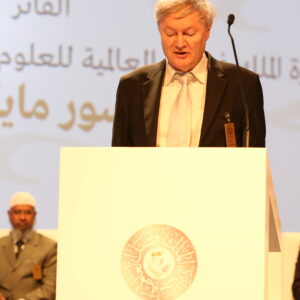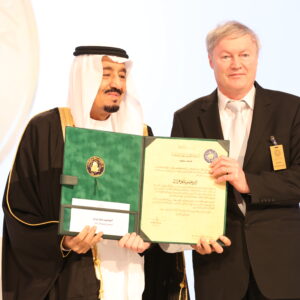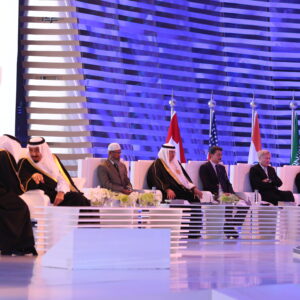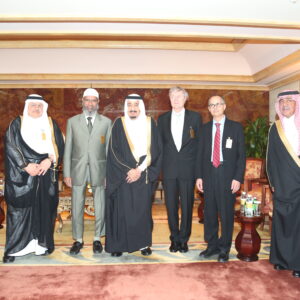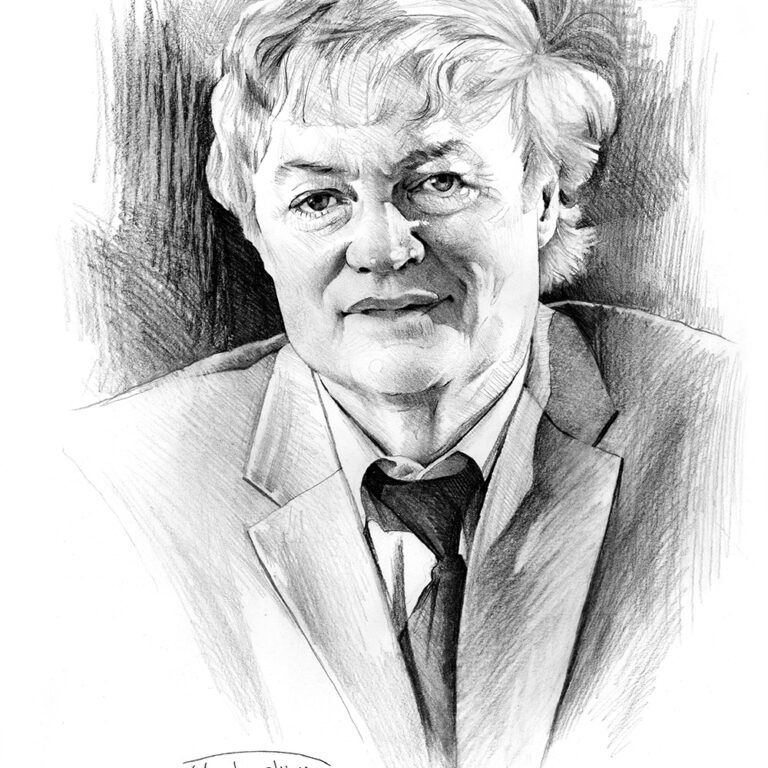

Professor Michael Grätzel
King Faisal Prize in Science 2015 Laureate
Topic: "Chemistry"
This high distinction is a great honor, which I accept with gratitude

Michael Grätzelreceived his Diploma from the Free University of Berlin in 1968 and his Ph.D. in Natural Sciences from the Technical University of Berlin in 1970, where he conducted his research under Professor Arnim Henglein at the Hahn Meitner Institute for Nuclear Sciences. He spent the following two years as a postdoctoral fellow at the Radiation Laboratory in the University of Notre Dame in Indiana, U.S.A. In 1976, he obtained Habilitation/Privat Dozent at the Free University of Berlin. He was also Mary Upson Visiting Professor at Cornell University, a Distinguished Visiting Professor at the National University of Singapore, an Adjunct Professor at King Abdulaziz University, Saudi Arabia, an Invited Professor at the University of California, Berkeley and the École Nationale Supérieure de Cachan (Paris), and an Honorary Part-Time Chemistry Chair at Delft University of Technology. Professor Michael Grätzel is currently a Professor at the École Polytechnique Fédérale de Lausanne, the Director of the Laboratory of Photonics at the Institute of Physical Chemistry, and a Distinguished Scientist at King Abdul-Aziz University.
Professor Grätzel pioneered the research on energy and electron transfer reactions in mesoscopic-materials and their optoelectronic applications. His foundational and practical discoveries have had and will continue to have a major impact on the practical realization of solar-energy conversion. He discovered a new type of solar cells based on dye sensitized nanocrystalline oxide films. These world-famous Grätzel solar cells, as they are called, are simple and relatively inexpensive to manufacture, while possessing unique practical properties including flexibility and transparency.
Professor Grätzel’s groundbreaking contributions have earned him worldwide recognition and numerous awards and honors, including the Balzan Prize, the Galvani Medal, Gerischer Award, Dutch Havinga Award and Medal, International Prize of the Japanese Society of Coordination Chemistry, ENI-Italgas Energy Prize, the Millenium European Prize of Innovation, Faraday Medal of the British Royal Society, the Marcel Benoist Prize, Albert Einstein World Award of Science, Gutenberg Research Award, Paul Karrer Gold Medal, and the McKinsey Venture Award (Twice). In addition, he received honorary doctorate degrees from 10 universities, namely the University of Liège and Hasselt University in Belgium, Roskilde University in Denmark, Huazhong University of Science and Technology in Wuhan, Nanyang Technical University in Singapore, Lund University and Uppsala University in Sweden, the University of Nova Gorica in Slovenia Delft University of Technology in the Netherland and Turin University in Italy. In 2009, he was named a Distinguished Honorary Professor by the Chinese Academy of Science and the Huazhong University of Science and Technology. He is a Member of the Swiss Chemical Society and the Bulgarian Academy of Science, Fellow of the European Academy of Science and the Japanese Society for the Promotion of Science, Honorary Fellow of the Royal Society of Chemistry and elected Honorary Member of the Société Vaudoise de Sciences Naturelles. He is also a frequent guest scientist at the National Renewable Energy Laboratory (NREL) in Golden, Colorado.
With more than 1200 publications, two books, over 60 inventions, a Hirsch-Index of 163, and about 120,000 total citations, Professor Grätzel ranks as one of the 10 most cited chemists in the world.
This biography was written in the year the prize was awarded.
He has been an External Scientific Member at the Max Planck Institute for Solid State Research in Stuttgart, Germany since 2018.

